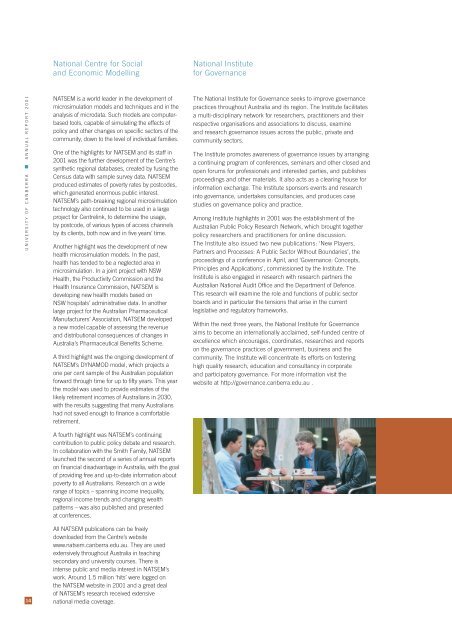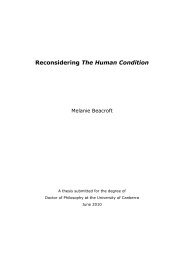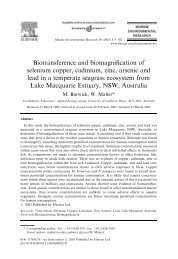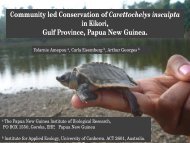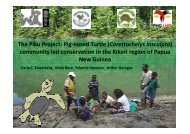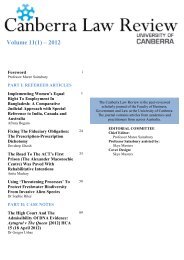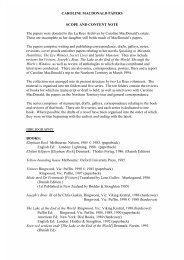Year 2001 - University of Canberra
Year 2001 - University of Canberra
Year 2001 - University of Canberra
You also want an ePaper? Increase the reach of your titles
YUMPU automatically turns print PDFs into web optimized ePapers that Google loves.
UNIVERSITY OF CANBERRA ANNUAL REPORT <strong>2001</strong><br />
14<br />
National Centre for Social<br />
and Economic Modelling<br />
NATSEM is a world leader in the development <strong>of</strong><br />
microsimulation models and techniques and in the<br />
analysis <strong>of</strong> microdata. Such models are computerbased<br />
tools, capable <strong>of</strong> simulating the effects <strong>of</strong><br />
policy and other changes on specific sectors <strong>of</strong> the<br />
community, down to the level <strong>of</strong> individual families.<br />
One <strong>of</strong> the highlights for NATSEM and its staff in<br />
<strong>2001</strong> was the further development <strong>of</strong> the Centre’s<br />
synthetic regional databases, created by fusing the<br />
Census data with sample survey data. NATSEM<br />
produced estimates <strong>of</strong> poverty rates by postcodes,<br />
which generated enormous public interest.<br />
NATSEM’s path-breaking regional microsimulation<br />
technology also continued to be used in a large<br />
project for Centrelink, to determine the usage,<br />
by postcode, <strong>of</strong> various types <strong>of</strong> access channels<br />
by its clients, both now and in five years’ time.<br />
Another highlight was the development <strong>of</strong> new<br />
health microsimulation models. In the past,<br />
health has tended to be a neglected area in<br />
microsimulation. In a joint project with NSW<br />
Health, the Productivity Commission and the<br />
Health Insurance Commission, NATSEM is<br />
developing new health models based on<br />
NSW hospitals’ administrative data. In another<br />
large project for the Australian Pharmaceutical<br />
Manufacturers’ Association, NATSEM developed<br />
a new model capable <strong>of</strong> assessing the revenue<br />
and distributional consequences <strong>of</strong> changes in<br />
Australia’s Pharmaceutical Benefits Scheme.<br />
A third highlight was the ongoing development <strong>of</strong><br />
NATSEM’s DYNAMOD model, which projects a<br />
one per cent sample <strong>of</strong> the Australian population<br />
forward through time for up to fifty years. This year<br />
the model was used to provide estimates <strong>of</strong> the<br />
likely retirement incomes <strong>of</strong> Australians in 2030,<br />
with the results suggesting that many Australians<br />
had not saved enough to finance a comfortable<br />
retirement.<br />
A fourth highlight was NATSEM’s continuing<br />
contribution to public policy debate and research.<br />
In collaboration with the Smith Family, NATSEM<br />
launched the second <strong>of</strong> a series <strong>of</strong> annual reports<br />
on financial disadvantage in Australia, with the goal<br />
<strong>of</strong> providing free and up-to-date information about<br />
poverty to all Australians. Research on a wide<br />
range <strong>of</strong> topics – spanning income inequality,<br />
regional income trends and changing wealth<br />
patterns – was also published and presented<br />
at conferences.<br />
All NATSEM publications can be freely<br />
downloaded from the Centre’s website<br />
www.natsem.canberra.edu.au. They are used<br />
extensively throughout Australia in teaching<br />
secondary and university courses. There is<br />
intense public and media interest in NATSEM’s<br />
work. Around 1.5 million ‘hits’ were logged on<br />
the NATSEM website in <strong>2001</strong> and a great deal<br />
<strong>of</strong> NATSEM’s research received extensive<br />
national media coverage.<br />
National Institute<br />
for Governance<br />
The National Institute for Governance seeks to improve governance<br />
practices throughout Australia and its region. The Institute facilitates<br />
a multi-disciplinary network for researchers, practitioners and their<br />
respective organisations and associations to discuss, examine<br />
and research governance issues across the public, private and<br />
community sectors.<br />
The Institute promotes awareness <strong>of</strong> governance issues by arranging<br />
a continuing program <strong>of</strong> conferences, seminars and other closed and<br />
open forums for pr<strong>of</strong>essionals and interested parties, and publishes<br />
proceedings and other materials. It also acts as a clearing house for<br />
information exchange. The Institute sponsors events and research<br />
into governance, undertakes consultancies, and produces case<br />
studies on governance policy and practice.<br />
Among Institute highlights in <strong>2001</strong> was the establishment <strong>of</strong> the<br />
Australian Public Policy Research Network, which brought together<br />
policy researchers and practitioners for online discussion.<br />
The Institute also issued two new publications: ‘New Players,<br />
Partners and Processes: A Public Sector Without Boundaries’, the<br />
proceedings <strong>of</strong> a conference in April, and ‘Governance: Concepts,<br />
Principles and Applications’, commissioned by the Institute. The<br />
Institute is also engaged in research with research partners the<br />
Australian National Audit Office and the Department <strong>of</strong> Defence.<br />
This research will examine the role and functions <strong>of</strong> public sector<br />
boards and in particular the tensions that arise in the current<br />
legislative and regulatory frameworks.<br />
Within the next three years, the National Institute for Governance<br />
aims to become an internationally acclaimed, self-funded centre <strong>of</strong><br />
excellence which encourages, coordinates, researches and reports<br />
on the governance practices <strong>of</strong> government, business and the<br />
community. The Institute will concentrate its efforts on fostering<br />
high quality research, education and consultancy in corporate<br />
and participatory governance. For more information visit the<br />
website at http://governance.canberra.edu.au .


